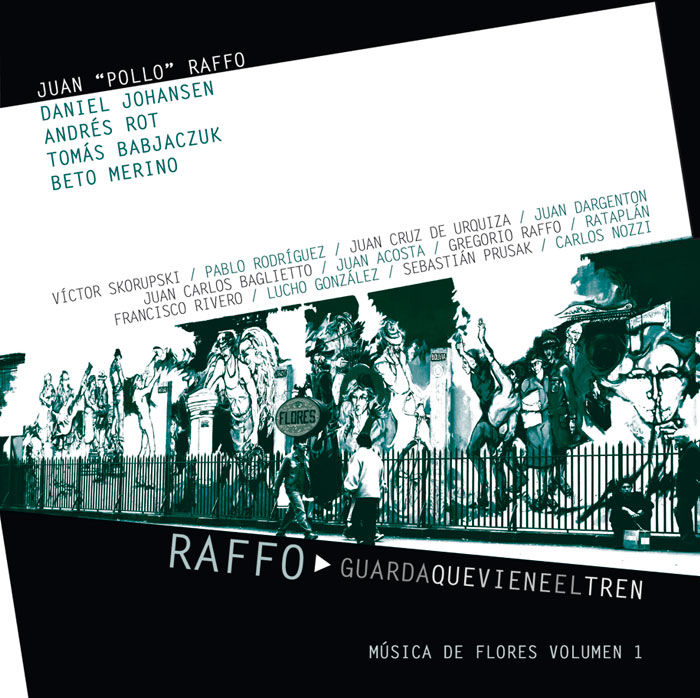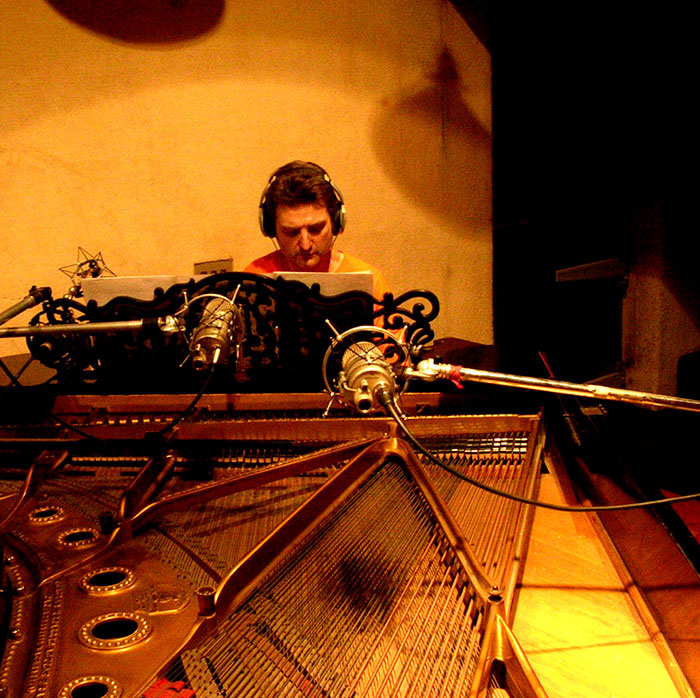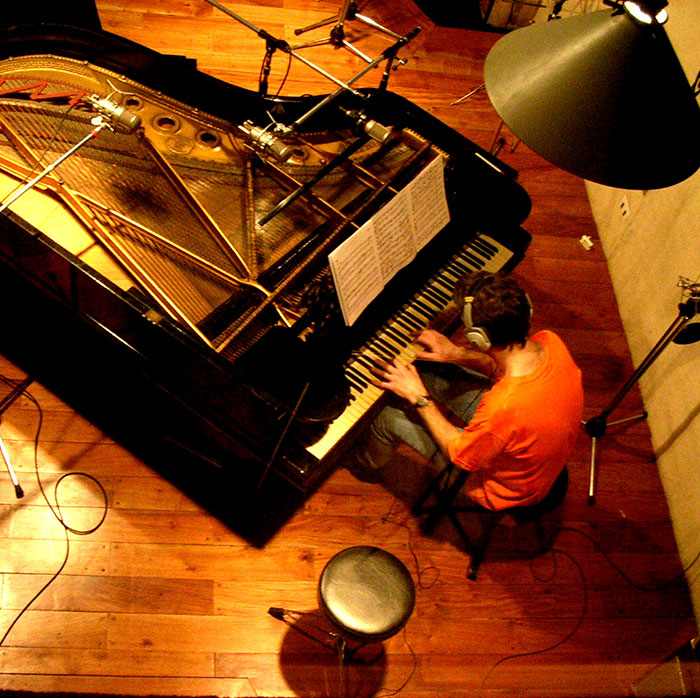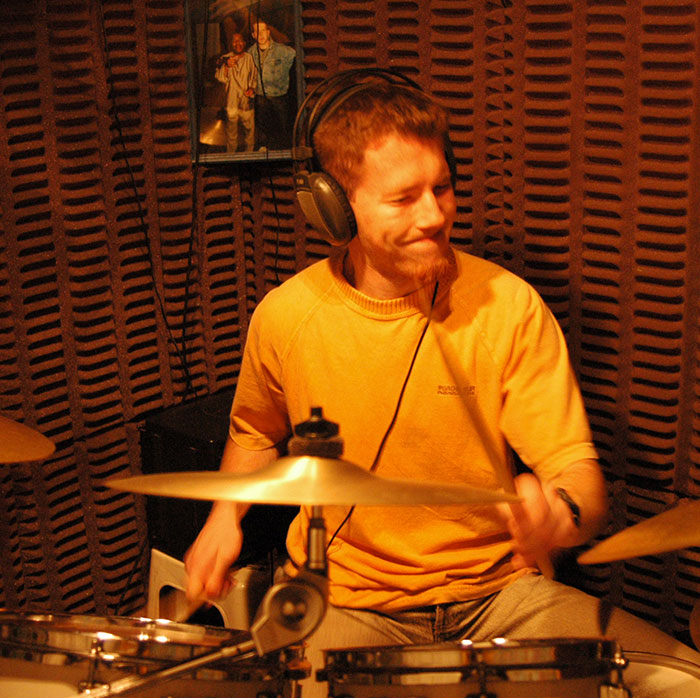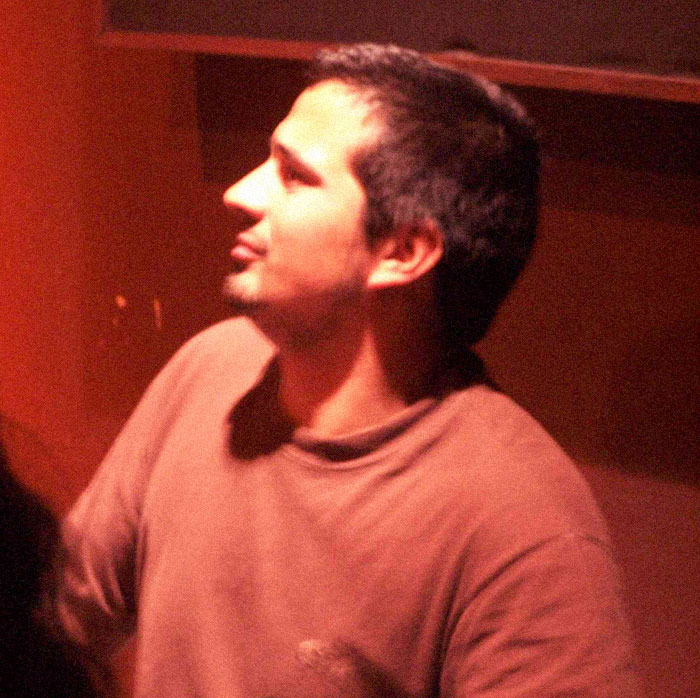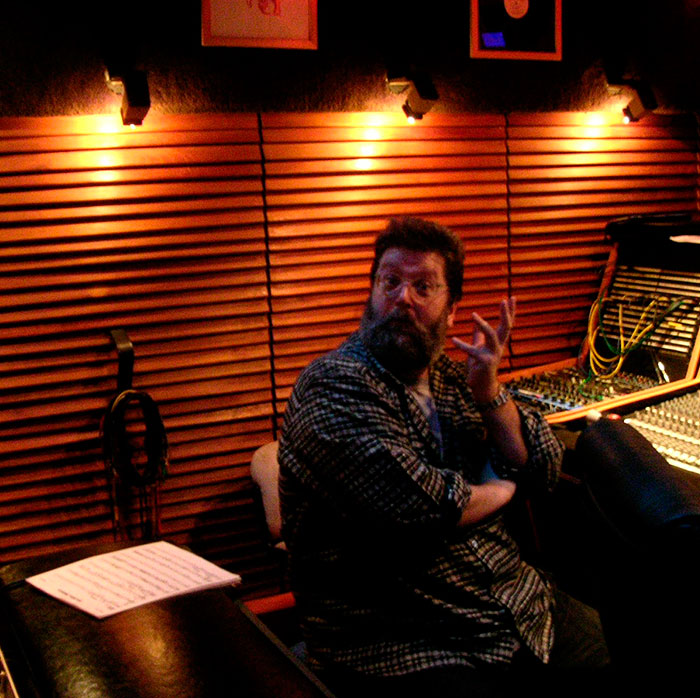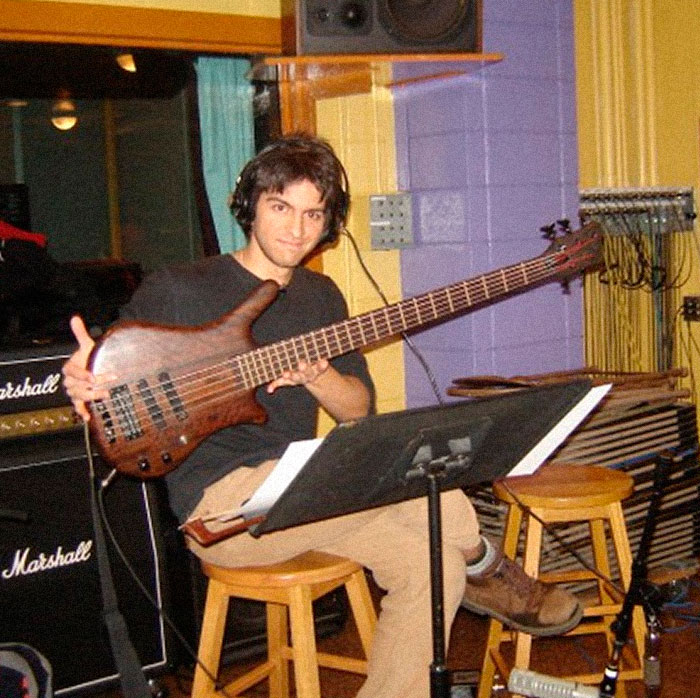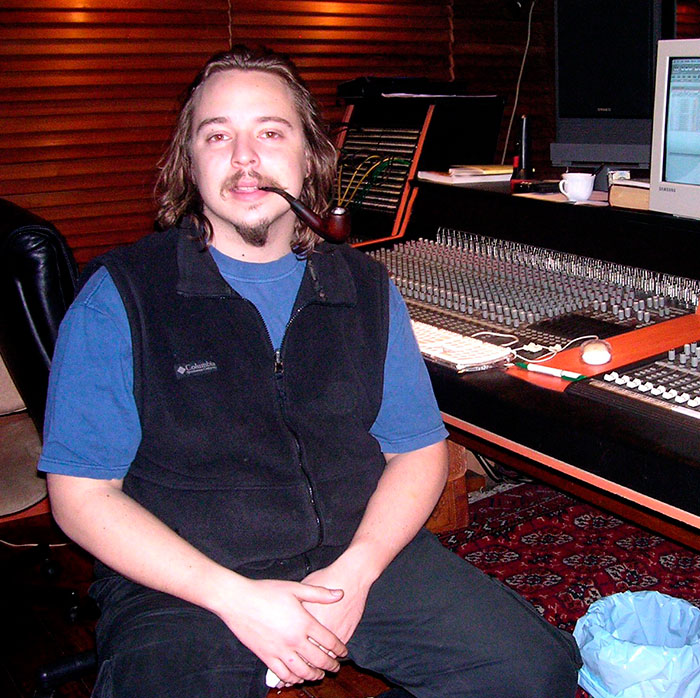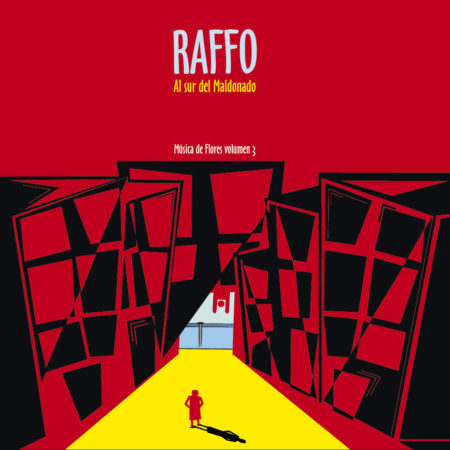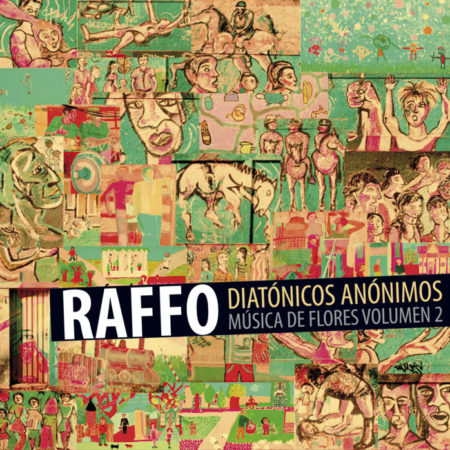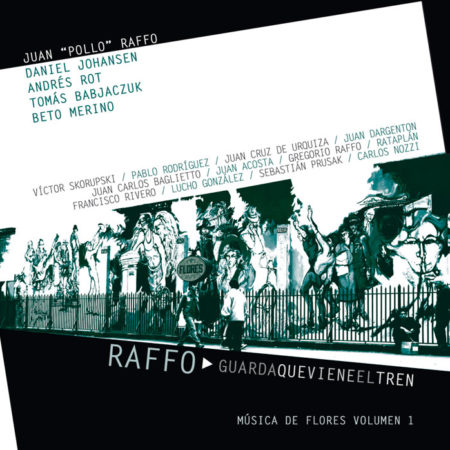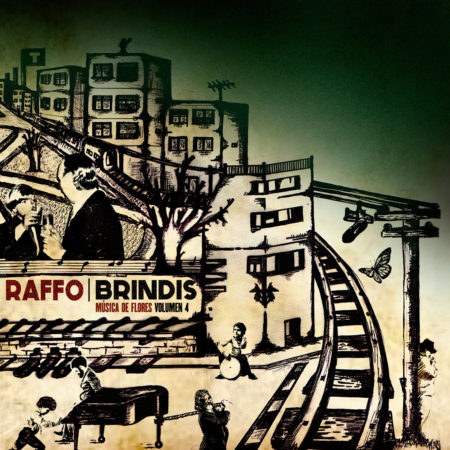RAFFO "GUARDA QUE VIENE EL TREN" · Música de Flores Vol.1 ·
PAI – 2006
- 01 Malabaristas Corto 1:20
- 02 El Rengo 1:35
- 03 Artigas 1:45
- 04 Cicatriz 1:48
- 05 Hell-Free Day 1:30
- 06 Sin Móvil Apar 1:42
- 07 La Represa Corto 1:10
- 08 Guarda Clip OK 1:26
- 09 Cuando Yo No Esté 1:04
LISTEN / BUY
- Dos Malabarista Descalzos
- El Rengo, La Bailarina y El Monito
- Artigas, Mano Izquierda
- Cicatriz
- Hell Free Day
- Sin Móvil Aparente
- La Represa
- Guarda Que Viene el Tren
- Cuando Yo No Esté
Music composed and arranged by Juan “Pollo” Raffo. Lyrics of “La Represa” written by Miguel Cantilo.
MUSICIANS
- Juan “Pollo” Raffo Acoustic And Electric Pianos, Hammond Organ, Synthesizers, Melodica, Samplers, Vocoder, Minimoog Bass.
- Daniel Johansen: Tenor and Soprano Saxophones.
- Andrés Rot: Electric and Acoustic Bass.
- Tomás Babjaczuk: Drums.
- Beto Merino: Percussion.
GUEST MUSICIANS
- Juan Carlos Baglietto: Lead vocals on “La represa”
- Víctor Skorupski: Alto flute and bass clarinet on “Sin móvil aparente”
- Pablo Rodríguez: Baritone saxophone on “El rengo, la bailarina y el monito”
- Juan Cruz De Urquiza: Trumpet and flugelhorn on “Sin móvil aparente”
- Rataplán: Candombe drums on “Artigas, mano izquierda”:
- Pablo Belmes, Lele Carroll y José Ureta: kids
- Lucas Helguero y Néstor Rijo: peals
- Santiago Lemos y Agustín Traversa Moré: pianos
- Juan Dargenton: Bandoneon on “El rengo, la bailarina y el monito”, “Cicatriz” y “Artigas, mano izquierda”
- Francisco Rivero: Electric and spanish guitar on “Artigas, mano izquierda”
- Lucho González: Spanish guitar on “La represa”
- Sebastián Prusak: Violin on “El rengo, la bailarina y el monito” y “Guarda que viene el tren”
- Carlos Nozzi: Cello on “Cicatriz”
- Street band on “Dos malabaristas descalzos”:
- Luis Bacqué: Trumpets and trombones
- Juan Raffo: Snare drum and synth tuba
- César Borra: Bass drum
- Juan Junca: Cymbals
- Voice samples on“Hell-free day”: Gregorio Raffo
- Police operation on “Sin móvil aparente”: Juan Acosta
- Strings on “La represa”: Gigaensamble Chacarita
- Coordinated and produced byPablo López Ruiz
- Warning choir on “Guarda que viene el tren”: Tomás Babjaczuk, Paola Hidalgo, Juan Junca, Luciano Maldonado, Beto Merino, Emiliano Messiez, Matías Ortiz, Alan Plachta, Juan Raffo, Luis Serna.
TECHNICAL SHEET
Recorded by Luis Bacqué at Mandarina studio
Studio assistants: César Borra and Juan Junca
Mixed by César Silva at El Hornero studio
Mastering: Pablo López Ruiz and Gustavo Fourcade at Steps Ahead Sound
“Hell-free day” recorded and mixed by Juan Raffo at NYU
Cover design and photographies: Francisco Sánchez Valassina and Emmanuel Panza
Edited by Fernando Lerman for P.A.I. Producciones Argentinas e Internacionales
www.pairecords.com.ar
Producido por Juan Raffo
www.polloraffo.com
Buenos Aires, winter of 2006
ACKNOWLEDGMENT
Todos los colegas/amigos invitados, Roxana y Gregorio, José Luis Sabakdanián, Pedro Piana, Alan Plachta, Eduardo Mileo, Marcelo Braga y La Emc, Ernesto Jodos, Miguel Loubet, Alicia D’emilio, Alicia Cévoli, Maia García, Ianina Trigo, Patricia Keena, Lucas Helguero, el anónimo silbador nocturno en el paso a nivel de Fray Luis Beltrán, Los pibes que cruzaban Boyacá, los malabaristas de la 9 de Julio y los muchachos del lubricentro “Mis Enanos”, César Silva, Pablo López Ruiz y Gustavo Fourcade, Juan Junca y César Borra Fernando Lerman, Francisco Sánchez Valassina y Emmanuel Panza, Juan Baglietto, Miguel Cantilo, Juan Acosta, Alejandro Dolina y sobre todo gracias a Luis Bacqué, por que sin su impulso y perseverancia este proyecto jamás se hubiera concretado.
Juan“Pollo” Raffo, invierno de 2006
PROLOGUE - Alejandro Dolina
The thinker from Flores, Manuel Mandeb, held that almost nobody likes music. According to his criteria, what truly draws the crowd are the circumstances adjoined to it: the poetry, the dancing, the theatricality; but also the appearance of the singers, their romances, their outfits, the doctrines which they appear to endorse, the attending public at concerts, the designs of album covers, the colorful lights, etcetera. A meager inspection of musical life in Argentina does not leave us far from Mandeb’s idea: music does not sell itself. There is always a side-dish, an addition, an extortion which guarantees an enthusiasm that does not need ears.
With identical pessimism, Eduard Hanslick held in the 19th century that music lacks all allusion, that it represents nothing, that it does not aspire to remind us of a lake or a dragon or a butterfly, but that it is a combinatory system, the logic of which produces emotion. It was a hard blow for those who believed in program music: that which, with each scale, each chord, represents some entity or fact of the real world. When someone could not be moved by a strictly musical discourse, he was explained that the cymbals were the cannons, the basses signaled the advance of the napoleonic troops and that the brasses saluted their victory at Borodino. And, satisfied with this elucidation, the incompetent would be left with the idea that music is a kind of sonic riddle.
This album abstains from any such extortion. Its virtues are strictly musical. Fervor and poetry appear here as qualities which assist the artist in realizing his music but are in no case a substitute.
“El Pollo” Raffo handles the elements of jazz and contemporary music with undoubted proficiency, but he has also managed, without neglecting any of these crafts, to become a part of the Argentinean musical tradition. Being an Argentinean composer is not something which can be certified with a national identification card. It is necessary to recognize parents and grandparents, as much to accept their legacy as to modify or even reject it. From this superfluous added column, I hastily predict that this record will have better luck among those who wish to listen than in the industry’s deaf chain of consumption.
Alejandro Dolina, July 2006.

